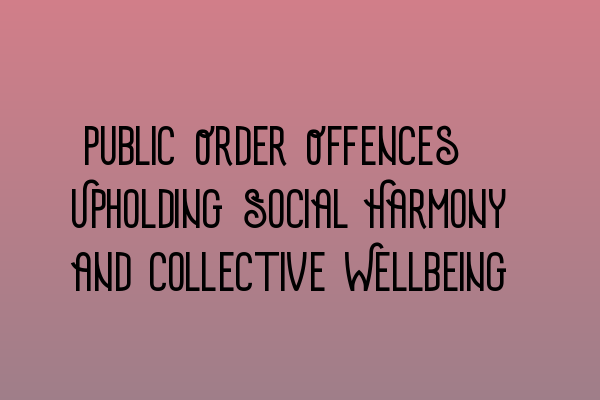Public Order Offences: Upholding Social Harmony and Collective Wellbeing
In a society built on order and harmony, it is essential to uphold public order and ensure collective well-being. Public order offences play a significant role in maintaining social stability and safeguarding the peaceful coexistence of individuals within a community.
The Importance of Public Order Laws
Public order offences encompass a range of behaviors that disrupt the peace and tranquility of a society. These offenses can include public disturbances, disorderly conduct, hate crimes, rioting, and other forms of anti-social behavior.
By having laws specifically designed to address public order offences, the criminal justice system can effectively respond to and deter such actions. Public order laws protect the rights and safety of individuals, promote peaceful public gatherings, and prevent the escalation of conflicts.
Understanding and respecting public order laws are crucial for maintaining a harmonious and inclusive society. Individuals should be aware of the consequences of their actions and the potential disruption they may cause to the peace and well-being of their fellow citizens.
Types of Public Order Offences
Public order offences can manifest in various forms, each with its own legal implications. Some commonly encountered public order offences include:
- Disorderly conduct: Any behavior that causes alarm, distress, or harassment to others in a public place can be classified as disorderly conduct.
- Rioting and violent disorder: Participating in or inciting a riot, violent disturbance, or public disorder is a serious public order offence.
- Hate crimes: Offenses driven by prejudice, bias, or hatred towards an individual or a group based on their race, religion, sexual orientation, or other protected characteristics are considered hate crimes and are prosecuted under public order laws.
- Public nuisance: Conduct that causes annoyance, inconvenience, or damage to the public or a specific group of people can be classified as a public nuisance offence.
Consequences of Public Order Offences
Public order offences can carry significant legal consequences, ranging from fines to imprisonment, depending on the severity of the offense. Convictions for public order offences may also result in a criminal record, which can have long-term implications on an individual’s personal and professional life.
It is crucial to take public order laws seriously and ensure compliance to avoid the legal ramifications and negative impact on one’s reputation.
Upholding Social Harmony and Collective Wellbeing
Public order offences threaten social harmony and disrupt the collective wellbeing of communities. By addressing and deterring such offenses, societies can cultivate an environment of tolerance, respect, and peaceful coexistence.
Lawyers specializing in criminal law, like those at SQE Criminal Law & Practice Law UK, play a vital role in upholding public order. Through their expertise, they navigate the complexities of public order laws and work towards justice and harmonious communities.
To further deepen your understanding of criminal law and prepare for the SQE exams, you can explore SQE 1 Practice Exam Questions or engage in SQE 1 Practice Mocks FLK1 FLK2. Preparing for the exams is essential to become a qualified solicitor.
For aspiring solicitors, SQE 2 Preparation Courses can provide comprehensive guidance and resources to enhance your knowledge and skills in criminal law. These courses equip you with the necessary tools to succeed in the SQE examinations and excel in your legal career.
Stay updated on important SRA SQE Exam Dates to ensure you are fully prepared and ready to take the next step towards becoming a qualified solicitor.
Remember, upholding public order is not just the responsibility of the authorities. Each member of society plays a crucial role in creating a safe, harmonious, and inclusive environment. Let’s work together to uphold social harmony and collective wellbeing for a better future.
